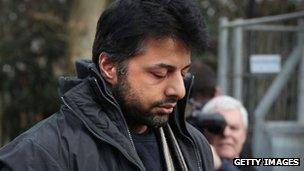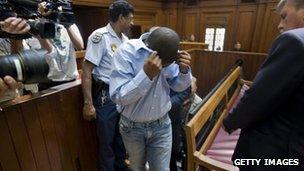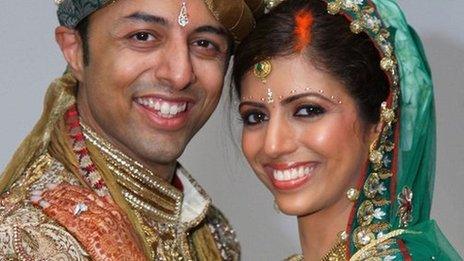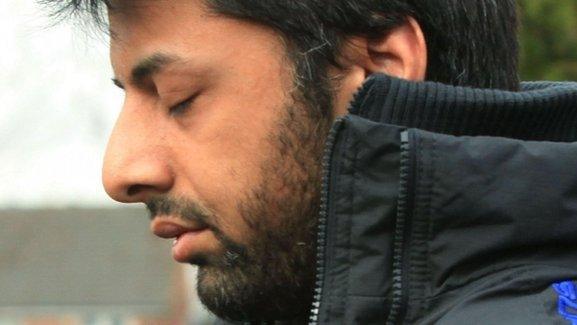Anni Dewani murder case evidence questioned
- Published
The BBC's Panorama examines the evidence surrounding Anni Dewani's murder
A leading forensic scientist has raised concerns about police evidence against businessman Shrien Dewani, who is accused of ordering the killing of his wife on their South African honeymoon.
The BBC's Panorama programme has obtained prosecution files on the case.
Anni Dewani, 28, was shot in a taxi on the outskirts of Cape Town in 2010.
Prof Jim Fraser said there was "simply a cloud of suspicion... rather than any evidence" against Mr Dewani, 33, from Bristol, who has denied involvement.
Prof Fraser told Panorama there were contradictions in the evidence of an expected key prosecution witness and the investigation would not meet UK standards.
Mr Dewani remains in the UK and has been sectioned under the Mental Health Act.
Sworn statement
In July, a British judge ruled that while he was not yet fit to plead, Mr Dewani should be extradited to South Africa to stand trial. He has appealed against the decision.
Mrs Dewani's family have called on him to return to South Africa to answer the charges and have criticised the BBC for conducting what they say is trial by television.
The couple's taxi driver Zola Tongo was jailed for 18 years in 2010 after he admitted his part in the killing, and another accomplice, Mziwamadoda Qwabe, also pleaded guilty to murder and was handed a 25-year prison sentence.
Among the police file of evidence examined by Panorama was Tongo's statement.
The evidence also includes video confessions, CCTV footage, phone records, scientific evidence and pictures of the crime scene.
Having struck a plea bargain for a reduced sentence, Tongo is expected to testify when the case alleging that Mr Dewani hired him goes to trial.
The CCTV footage and phone records obtained by Panorama appear to contradict Tongo's sworn statement, the programme has said.
On the day Mrs Dewani was murdered, the couple had had a late breakfast. Tongo's statement says Mr Dewani called him at 11:30, during the meal, asking to be picked up. But phone records in the police file show there was no such call.
In the evening, Mr Dewani called Tongo from the Cape Grace hotel, when the taxi driver was late to pick them up to take them to dinner.
'Agitated state'
In a newspaper interview before he became a suspect, Mr Dewani said: "Our driver was delayed. So when he said he was late, we just had another drink and carried on chatting."
In his statement, Tongo says: "Dewani called me in an agitated state to find out where I was."
His lawyer, William da Grass, added: "Dewani demanded to know what the hold-up was and insisted that the act be perpetrated and perpetrated that very day."
Yet the CCTV obtained by Panorama shows Mr Dewani holding his phone to his left ear - the one nearest Mrs Dewani - while she sits beside him. He shows no sign of agitation.
Tongo then drove the couple to a restaurant in the beach resort of Strand.
In his statement, Tongo says that when they arrived Mr Dewani became furious Mrs Dewani had not yet been murdered.
"I walked with them to the restaurant. At the entrance the lady went in and Dewani turned around and spoke to me," he says.
"He appeared stressed and threatened me. He said if the 'job' was not done that evening he was going to kill me."
But the CCTV camera covering the entrance appears to contradict Tongo's testimony.
The footage shows the three of them walking towards the restaurant together.
Furthermore, it is not Mrs Dewani who heads in first - as Tongo says - but Mr Dewani. A waiter has confirmed this to Panorama.
'Crucial point'
Prof Jim Fraser said this was an important inconsistency.

In July, a judge ruled that Shrien Dewani should be extradited to South Africa to stand trial
"This is a crucial point, so there is a very damning statement made by one co-conspirator of another - Shrien Dewani - which could have been tested to some degree by at least seeing if it was feasible on CCTV," he said.
Provided the timer on the CCTV camera is correct, phone records in the police file show that eight seconds after disappearing from view, Tongo made a phone call.
According to Tongo's statement, in just eight seconds, Mr Dewani was supposed to have threatened Tongo and demanded Mr Dewani's murder that night.
Prof Fraser has advised the Home Office on a number of high-profile cases including the investigation into the killing of Damilola Taylor in south London in 2000.
He said the number of contradictions in the evidence was significant.
"A single thing that was inconsequential - even a number of things that were inconsequential - wouldn't worry me," he said.
"But there are really quite a few things here which are plainly untrue.
"This is not an investigation that would meet the standards in this country. This is not what would be considered to be good practice.
"There are many things that fall a long way short of effective investigation.
"There is simply a cloud of suspicion hanging over [Mr Dewani] rather than any evidence that he was involved."
Key phone records
Much of the case rests on what was said in calls and texts between Mr Dewani and Tongo.
But Panorama has learnt that experts have not been able to retrieve the actual text messages.
Prof Jim Fraser said they were key to the investigation.

Zola Tongo shielded his face from reporters when he appeared in a Cape Town court in 2010
He said: "If we had the actual calls themselves, if we had the texts, they would unquestionably in my mind completely unlock this case."
The South African police said it would be improper to engage with the media on the merits of the case as it would violate Mr Dewani's right to a fair trial.
Panorama - The Honeymoon Murder: Who Killed Anni?, BBC One, Thursday 19 September 21:00 BST and then available in the UK on the BBC iPlayer.
- Published8 December 2014

- Published4 July 2013
